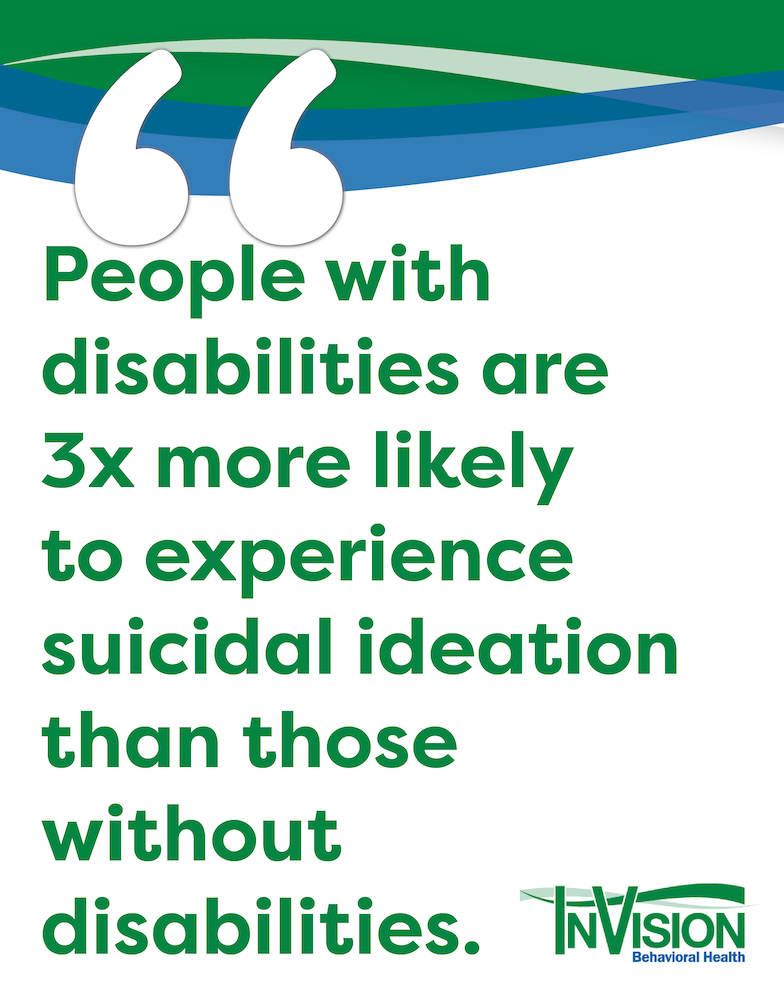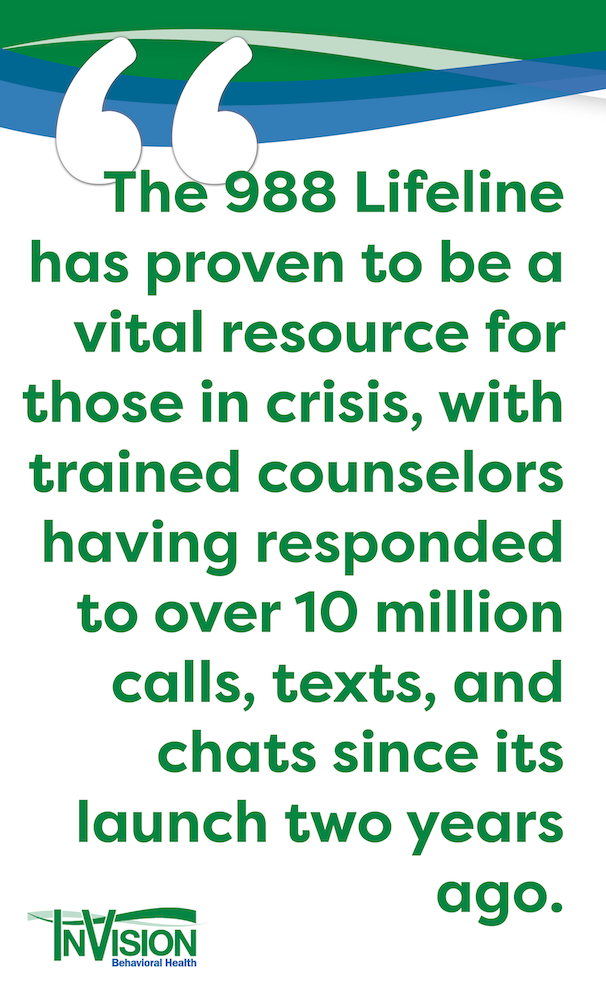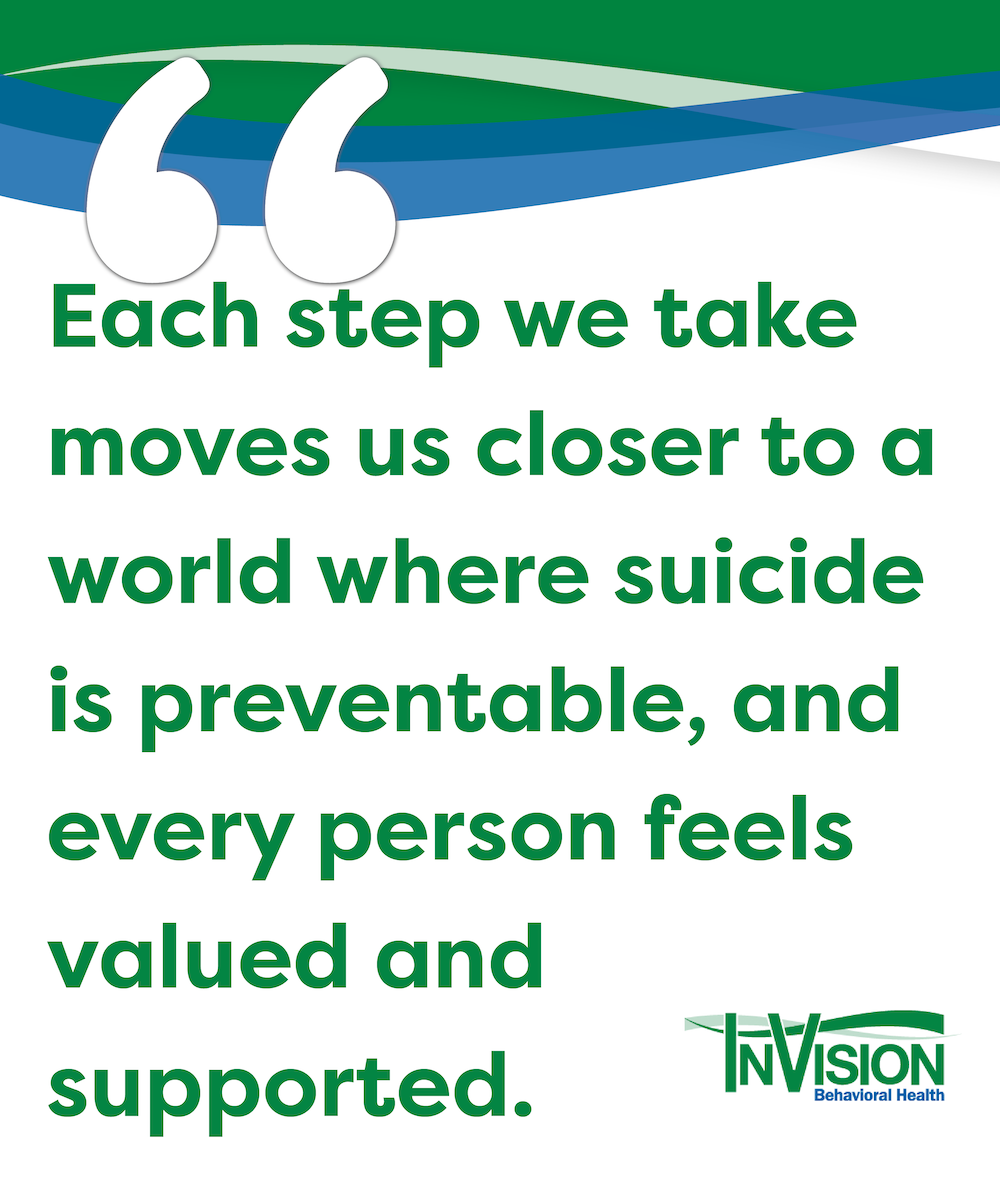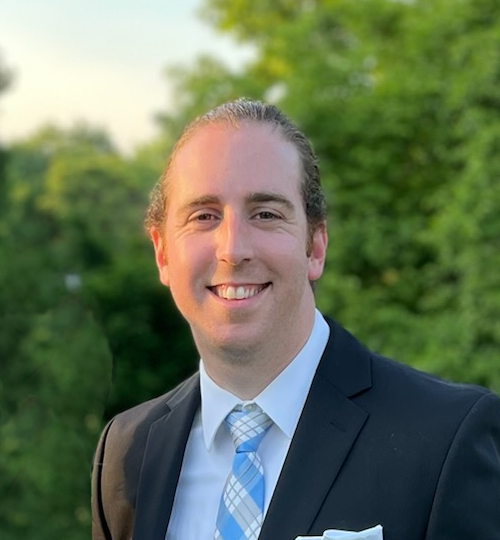The InVisionary
As we recognize National Suicide Prevention Month this September, it's crucial to understand that our actions, conversations, and advocacy can help save lives. This year marks the start of a new three-year theme focused on “Changing the Narrative on Suicide.” Moving beyond awareness, this initiative calls for cultural and systemic changes that prioritize meaningful education, advocacy for resources, and ongoing efforts to prevent suicide.
 Certain populations face an even greater risk, with suicide rates among American Indian or Alaska Native people increasing by 26% between 2018 and 2021. Black individuals saw a 19% increase, and the rate for Hispanic persons increased by nearly 7%. Moreover, people with disabilities are 3x more likely to experience suicidal ideation than those without disabilities. These suicide rates are specifically from Pennsylvania, but they tend to correlate no matter where you’re looking in the United States.
Certain populations face an even greater risk, with suicide rates among American Indian or Alaska Native people increasing by 26% between 2018 and 2021. Black individuals saw a 19% increase, and the rate for Hispanic persons increased by nearly 7%. Moreover, people with disabilities are 3x more likely to experience suicidal ideation than those without disabilities. These suicide rates are specifically from Pennsylvania, but they tend to correlate no matter where you’re looking in the United States.
These statistics are more than just numbers; they represent real people—our friends, neighbors, and loved ones. At InVision Behavioral Health, we are committed to fostering a culture where conversations about mental health and suicide prevention are normalized and encouraged. Our therapists also want to encourage everyone to learn how they can make a difference.
 Locally, Pennsylvania has undertaken several efforts to promote suicide prevention, including awareness campaigns for the 988 Suicide & Crisis Lifeline. Calling or texting 988 connects you with a trained crisis counselor for free. Your conversation is confidential, and someone is available 24 hours a day, seven days a week. This lifeline has proven to be a vital resource for those in crisis, with trained counselors having responded to over 10 million calls, texts, and chats since its launch two years ago.
Locally, Pennsylvania has undertaken several efforts to promote suicide prevention, including awareness campaigns for the 988 Suicide & Crisis Lifeline. Calling or texting 988 connects you with a trained crisis counselor for free. Your conversation is confidential, and someone is available 24 hours a day, seven days a week. This lifeline has proven to be a vital resource for those in crisis, with trained counselors having responded to over 10 million calls, texts, and chats since its launch two years ago.
Additionally, Pennsylvania has partnered with the Columbia Lighthouse Project to launch an updated version of the Columbia Suicide Severity Rating Scale (C-SSRS) app, which provides an evidence-based tool for screening those at risk.
According to Prevent Suicide PA, “Experts agree that clinical depression is one of the biggest risk factors for suicidal thoughts.” Depression can be treated with medicine, counseling, including making use of the 988 Lifeline, or a combination of the two. Approximately 80% of the people who seek help for their depression improve their treatment. Therapies such as cognitive behavioral and talk therapy can help with depression.
 As we recognize National Suicide Prevention Month, let us commit to acting not just in September, but every day. Start a conversation, share a resource, or support someone in need. Each step we take moves us closer to a world where suicide is preventable, and every person feels valued and supported.
As we recognize National Suicide Prevention Month, let us commit to acting not just in September, but every day. Start a conversation, share a resource, or support someone in need. Each step we take moves us closer to a world where suicide is preventable, and every person feels valued and supported.
If you or someone you know is struggling, remember that help is available 24/7 through the 988 Suicide & Crisis Lifeline. You can also explore the comprehensive mental health services offered by InVision Behavioral Health, designed to support your unique needs and provide a pathway to hope and recovery. For more information, please contact us at behavioralhealth@invisionhs.org or call (724) 933-2961. Let’s continue to change the narrative on suicide—together.
Why Suicide Prevention Matters
Suicide is an urgent public health issue and can affect anyone, making its impact deeply felt within our communities. It affects all ages, races, genders, sexuality, denominations, and income and educational levels. Recent statistics highlight the severity of the problem, too.- In the United States, suicide deaths increased by 2.6% from 2021 to 2022, making it the 11th leading cause of death.
- According to the CDC, 12.3 million adults seriously thought about suicide and 1.7 million attempted it in 2021.
- Of those, more than 48,000 people died by suicide in 2021, which is about one death every 11 minutes.
 Certain populations face an even greater risk, with suicide rates among American Indian or Alaska Native people increasing by 26% between 2018 and 2021. Black individuals saw a 19% increase, and the rate for Hispanic persons increased by nearly 7%. Moreover, people with disabilities are 3x more likely to experience suicidal ideation than those without disabilities. These suicide rates are specifically from Pennsylvania, but they tend to correlate no matter where you’re looking in the United States.
Certain populations face an even greater risk, with suicide rates among American Indian or Alaska Native people increasing by 26% between 2018 and 2021. Black individuals saw a 19% increase, and the rate for Hispanic persons increased by nearly 7%. Moreover, people with disabilities are 3x more likely to experience suicidal ideation than those without disabilities. These suicide rates are specifically from Pennsylvania, but they tend to correlate no matter where you’re looking in the United States.These statistics are more than just numbers; they represent real people—our friends, neighbors, and loved ones. At InVision Behavioral Health, we are committed to fostering a culture where conversations about mental health and suicide prevention are normalized and encouraged. Our therapists also want to encourage everyone to learn how they can make a difference.
Current Suicide Prevention Efforts
At the national level, suicide prevention strategies are being enhanced through the recent release of a new National Strategy for Suicide Prevention and an accompanying Federal Action Plan outlining more than 200 steps for implementation over the next three years. Central to these initiatives are the principles of health equity and support for populations disproportionately affected by suicide. The plan also emphasizes the involvement individuals with suicide-centered lived experience in creating these strategies. Locally, Pennsylvania has undertaken several efforts to promote suicide prevention, including awareness campaigns for the 988 Suicide & Crisis Lifeline. Calling or texting 988 connects you with a trained crisis counselor for free. Your conversation is confidential, and someone is available 24 hours a day, seven days a week. This lifeline has proven to be a vital resource for those in crisis, with trained counselors having responded to over 10 million calls, texts, and chats since its launch two years ago.
Locally, Pennsylvania has undertaken several efforts to promote suicide prevention, including awareness campaigns for the 988 Suicide & Crisis Lifeline. Calling or texting 988 connects you with a trained crisis counselor for free. Your conversation is confidential, and someone is available 24 hours a day, seven days a week. This lifeline has proven to be a vital resource for those in crisis, with trained counselors having responded to over 10 million calls, texts, and chats since its launch two years ago.Additionally, Pennsylvania has partnered with the Columbia Lighthouse Project to launch an updated version of the Columbia Suicide Severity Rating Scale (C-SSRS) app, which provides an evidence-based tool for screening those at risk.
According to Prevent Suicide PA, “Experts agree that clinical depression is one of the biggest risk factors for suicidal thoughts.” Depression can be treated with medicine, counseling, including making use of the 988 Lifeline, or a combination of the two. Approximately 80% of the people who seek help for their depression improve their treatment. Therapies such as cognitive behavioral and talk therapy can help with depression.
How You Can Make a Difference
Every individual can play a role in suicide prevention. By fostering a culture of openness, support, and compassion, we can help those who are suffering feel less alone and more understood.- Reach out to someone who may be struggling.
- Engage in awareness campaigns on social media.
- Share resources like the 988 Lifeline.
 As we recognize National Suicide Prevention Month, let us commit to acting not just in September, but every day. Start a conversation, share a resource, or support someone in need. Each step we take moves us closer to a world where suicide is preventable, and every person feels valued and supported.
As we recognize National Suicide Prevention Month, let us commit to acting not just in September, but every day. Start a conversation, share a resource, or support someone in need. Each step we take moves us closer to a world where suicide is preventable, and every person feels valued and supported.If you or someone you know is struggling, remember that help is available 24/7 through the 988 Suicide & Crisis Lifeline. You can also explore the comprehensive mental health services offered by InVision Behavioral Health, designed to support your unique needs and provide a pathway to hope and recovery. For more information, please contact us at behavioralhealth@invisionhs.org or call (724) 933-2961. Let’s continue to change the narrative on suicide—together.

Comments (0)